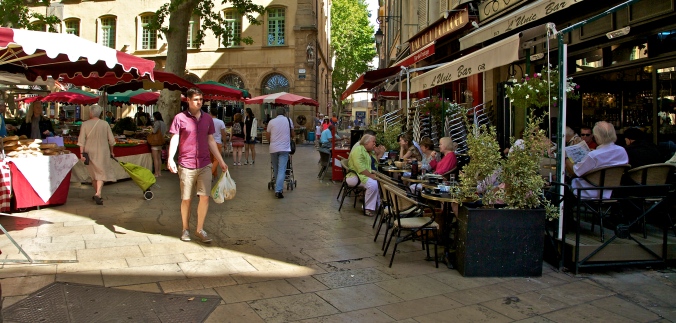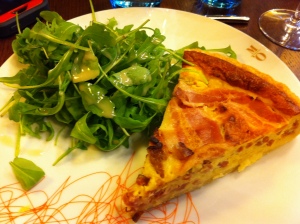I’m currently on the brink of another visit to Aix-en-Provence and I’m reminded of one of the major reasons I enjoy visiting France so much—particularly out of season.

The boulangerie in our village always had odd cookies–at least odd to American children–but that just made it all the more amazing to us.
AFour years ago, I took a trip to Germany and Switzerland with an all-male entourage of two brothers, my husband and son.
My brothers hadn’t been back to Europe in years. My youngest brother hadn’t been back since he was nine years old when my father was stationed Stateside after three years in France and Germany. I mention this because until that trip I assumed that I was attracted to certain places for similar reasons that anybody else was—I loved France because of the lilt of the language, the amazing pastries, the quaint cobblestone streets. And since I’d heard other people gush on about those qualities too I assumed we were all on the same page for why we loved to visit Europe.
But it wasn’t until I went back with two of the people I’d grown up with that I realized that I had a hidden trigger that was personal and special when it came to Europe. I can’t even say I share this particular proclivity with people who grew up in Europe because it was the very point of feeling foreign—at nine years old—that not only made the experience so much more intense but also indelible.
At one point in our trip, we were in Murren in the Swiss Alps. We’d spent the night there and were up early the next morning for a walking trek we all wanted to take. This was early June but when we woke up there was snow on the ground in the village. My brothers and I happened to be the first ones up and as we waited for my husband and son, we three stepped outside into the cold.
Instantly, I detected a familiar scent—one I’d smelled on and off during my travels—and one that was exactly like the air on any winter’s day in Ars-sur-Moselle, the village where I lived as a child.

A street in Ars-sur-Moselle…my walk to the convent school in fact!
The scent was a mixture of burning coal, diesel fuel and urine. I’m sure it’s common in most villages—especially in the days a scant twenty years after the war.
The minute I smelled it, I saw both my brothers snap their heads around and look at each other with their mouths open.
They remembered it too.
“It’s Ars,” they both said at the same time. “It smells just like Ars.”
They hadn’t smelled anything like it in fifty years. But the second they did they were instantly transported back to the rolling hills and streets of our little Alsatian village with all the play and carefree adventure that our childhood could hold.

My middle brother Kevin with a French pal at our house in Ars
When my husband and son came out, they confirmed that they didn’t smell anything particularly unusual but even so I noticed my son wrinkled his nose. He smelled it, but it didn’t mean anything to him beyond being vaguely unpleasant.
My two brothers and I had just had a snapshot visit from the past, one as dramatic and real as a surprise meeting with a ghost.
It was then that I realized that a good part of my fascination with Europe was my desire to connect with my childhood—those happy memories that live in my mind—and are only released by a strange, indefinable fragrance (hey, sometimes the scents are pleasant!) or the random way the sun glimmers off wet dark roof tiles—all the things we noticed as children but stopped seeing as adults.
When you’re in a foreign environment, everything is so different from your usual daily round that the smallest things leap out at you. You tend to really see things. (And smell them.)

Me (age 10) and my father at the Frankfurt Zoo (Air Force issue glasses! Zut alors!)
Maybe that’s another reason so many of us like to travel. Travel helps you see the world through a child’s eyes again. But for me, I now know there’s another reason, a much more personal reason—and why China or Hawaii or Singapore—as lovely as those places are—don’t cut it for me in the true wonder department.
For me, being in France or Germany really does feel a little bit like coming home again.
How about you? Anybody else able to pinpoint the particular wonder and joy of being someplace that reminds them of another place, another time?






















